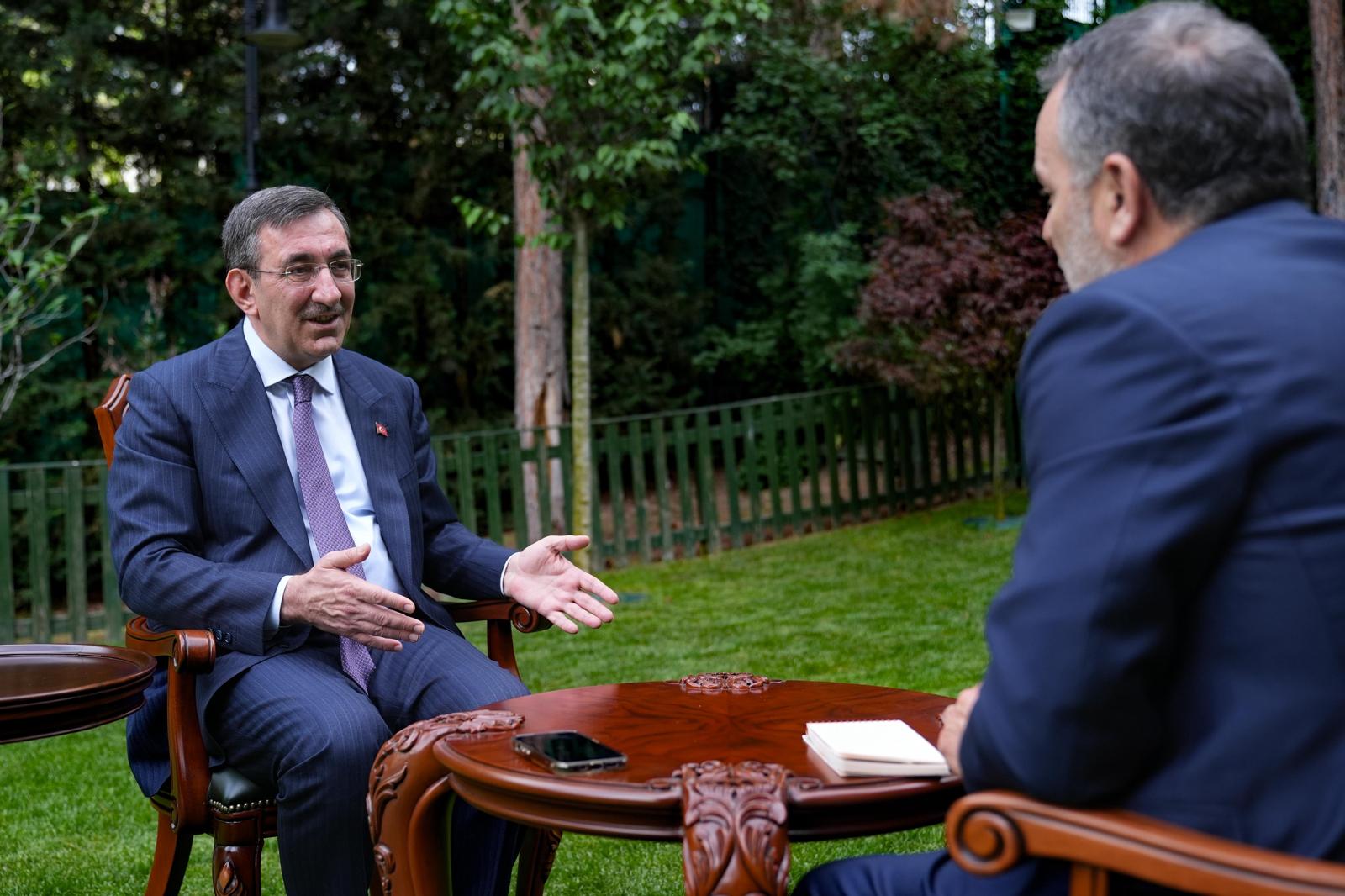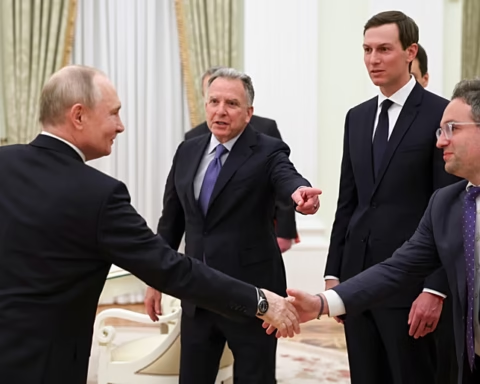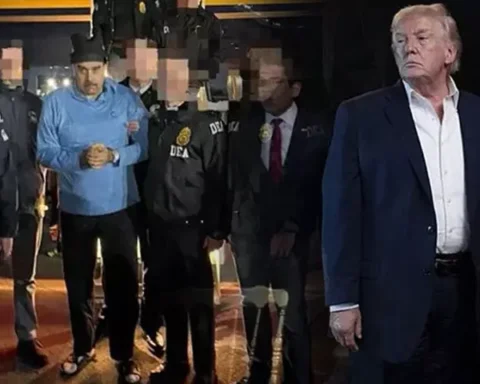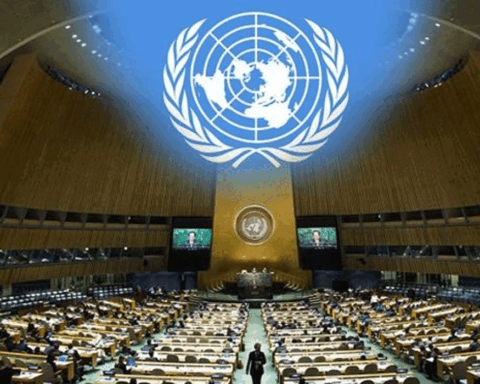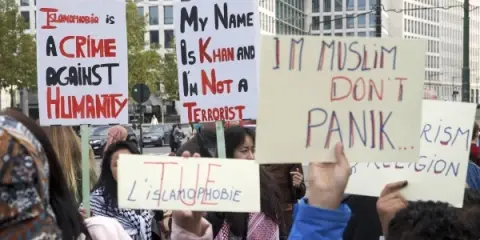Vice President of Türkiye Cevdet Yılmaz: Our Top Priority Is for the Organization to Lay Down Its Arms
Vice President of Türkiye Cevdet Yılmaz made important statements on many topics including a Terror-Free Türkiye, the economy, foreign policy, Gaza, Syria, and relations with the United States. You can read the Turkish version of my interview with him for Al Jazeera in a question-and-answer format below. The link to the Arabic version is at the end of the interview.
PERSONAL NOTE:
I have known Mr. Cevdet Yılmaz since 2007, when he first became a Member of Parliament. I followed his work closely when he served as Minister of Development (2011) and later as Deputy Prime Minister. Even during the years when he held no government or party position, we remained in contact in one way or another.
Now, as the Vice President of the Republic of Türkiye, he is overseeing the country’s most critical issue: the economy, together with his team.
I mention all this because the Cevdet Yılmaz I saw in 2007 is the same person I see in 2025. The man I knew when he had no official position is exactly the same as the Vice President I know today.
Humble, unpretentious, respectful, modest, focused on his work… Frankly, I am deeply impressed by how someone who is among the most competent experts in Türkiye and who now holds such high office can still remain so humble.
That is why I wanted to include this special note in the interview.
—Kemal Öztürk
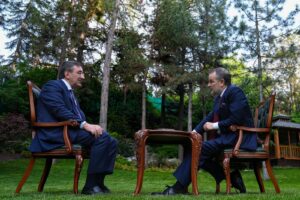
“Stability in Syria Means Stability for the Region”
Question:
While we are conducting this interview with you, a surprise visit is taking place in Türkiye. Syrian President Ahmad Shar’a has arrived in Türkiye. Why did Ahmad Shar’a come? What is the current state of Türkiye–Syria relations?
Yılmaz:
Syria is an extremely important country for us. It is our neighbor, sharing a border of over 900 kilometers and deep historical ties. Therefore, every development in Syria, whether positive or negative, directly concerns us. After more than sixty years of dictatorship and a brutal regime, a revolution took place in Syria. The country has now entered a new era. In this new era, the foundation of our approach to Syria is built upon establishing security and stability and preserving Syria’s unity and territorial integrity. Within this framework, it is particularly important that a system of governance embracing all elements within Syria comes to life.
At the same time, we are talking about a devastated country — both in terms of its physical infrastructure and its institutions. There is a pressing need for reconstruction and redevelopment. From its legal and institutional framework to its physical infrastructure — roads, energy systems, and economic investment environment — Syria needs to be rebuilt. Türkiye stands in full solidarity with Syria in all of these areas. We are committed to contributing to Syria’s political stability and security, and we are fully prepared to share our experience and extend all necessary support during the reconstruction process.
We firmly believe that a stable and prosperous Syria is not only essential for the Syrian people but also vitally important for the entire region. We are confident that this will make a significant contribution to regional stability and prosperity. Looking at it from Türkiye’s perspective, a rebuilt, more stable and secure Syria will also bring great benefits to our country. I truly believe this with all my heart.
“Netanyahu Wants an Unstable Middle East”
Question:
Türkiye advocates for a unitary Syrian state. It wants to see Syria remain whole and opposes any division. On the other hand, Israel supports a fragmented Syria. Is there a power struggle between Türkiye and Israel?
Yılmaz:
The Syrian people have suffered greatly from the conflict. They have paid a very heavy price. It is time for them to enjoy stability and a more secure environment. As I said, Türkiye is doing everything it can in this regard.
However, Israel’s actions—particularly those that violate Syrian borders and destabilize the region—are seriously harming Syria’s reconstruction efforts. We strongly oppose these actions. We believe the Syrian people do not deserve this. As Türkiye, we are actively working through all international platforms, alongside other nations concerned with Syria, to stop such violations of international law and of the rights of the Syrian people. We are exerting every effort to ensure Syria is not further harmed. We sincerely hope Israel will not escalate these actions. Unfortunately, Israel displays a similar stance in Lebanon as well. We view this as part of the Netanyahu government’s pursuit of a deliberately unstable region, from which it seeks to extract strategic benefits. However, the correct path is to build a stable regional environment and extend that stability throughout the Middle East.
As you’ve pointed out, our position is very clear. We absolutely do not condone Israel’s aggressive actions against Syria. We continuously express that these acts are against international law. At the same time, we continue our efforts to strengthen the central government in Syria and to restore a sense of peace and order within Syrian society.
“SDF must abide by its agreement with Damascus”
Question:
One of the major issues within Syria is the YPG. You are conducting a project called “A Terror-Free Türkiye.” A call was made to Öcalan and the PKK to lay down their arms. However, the YPG resists this. In fact, YPG is the only group left within Syria that has refused to disarm and rejected integration. What will happen with this problem?
Yılmaz:
As you know, an agreement was made between the Damascus government and the SDF. They developed a roadmap with the central government. We expect them to abide by this roadmap, by that agreement. The essential point is that, just like in all other regions, the area under SDF control must also be brought under the authority of the central government. And by central government, we mean a Syria that includes all its components. This is not about a single ethnic group or a single sect. We are referring to the full richness of Syria built on equal citizenship—Sunnis, Alawites, Nusayris, Muslims, Christians, Druze, Kurds, Turkmens, Arabs—all segments of the population coming together on the basis of equal citizenship.
The way to achieve this is through strengthening the central government. With representative institutions, its parliament, and the new constitutional efforts underway, we expect a new governance structure to emerge in Syria—an inclusive one. When this occurs, Kurds, like other ethnic groups, will participate in political processes and every kind of economic activity as first-class citizens of Syria. They will be in a position not of conflict or division, but one that contributes positively to Syria’s reconstruction. Any other developments would pose a threat to Syria’s unity and integrity, and would leave the country vulnerable to external influences and interventions. This is beneficial neither for the Kurds nor for Syria. What should happen is that all these diverse groups—who have shared a common history and civilization in Syria for centuries—should prepare Syria for the future together, and rebuild it together.
“The central government must be strong in Syria”
I genuinely consider the constitutional process to be extremely important in this regard. The drafting of a new constitution must proceed in a participatory manner and should establish an inclusive political framework. However, the essence of the matter lies in the strengthening of the central government. As the central government enhances its institutional capacity and extends its authority across the country physically, many of these issues will largely resolve themselves.
It is no longer appropriate to view Syria through outdated lenses—through the mindset of the Assad regime. We are talking about a new framework, a new Syria, and this Syria must avoid repeating the mistakes of the past. A group positioning itself as a minority will not benefit from such a stance. Everyone in Syria must find their place as equal and first-class citizens.
“Syria’s civilizational heritage is deeply valuable”
Syria’s civilizational background actually provides a solid foundation for this. If you look at Syria’s history, it is not an ordinary country—it is a nation with a tremendous civilizational legacy. Its culture of coexistence is in fact highly developed. When you remove the Assad regime as an exception, Syria’s history reveals a magnificent heritage. I remember visiting Syria in the past when I was Minister of Development. Even under the oppressive regime, one could observe this culture of coexistence among different segments of society—on the streets, in the bazaars. So Syria already possesses this infrastructure, this cultural foundation. What matters now is to enshrine it within a legal framework for the Syrian people. As long as they do this, they will swiftly move away from discussions that could lead to separatism or internal conflict.
Question:
Do you think Israel has a role in the YPG’s resistance to this?
Yılmaz:
There may be countries—Israel being the foremost—that see maintaining Syria in a state of internal conflict as serving their interests, making the country open to intervention. But this benefits no one—not the Syrian people, not the Kurds, not the Arabs, not the Turkmens. Therefore, our perspective should be one that focuses on the real needs of the people, on their genuine expectations. And I firmly believe the Syrian people will succeed in this.
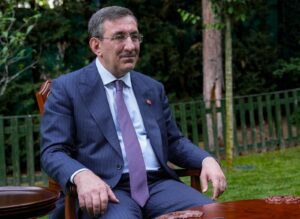
Quadruple meeting in Riyadh
Question:
The meeting in Riyadh involving Mohammed bin Salman, Ahmet Shar’a, and Trump was a major surprise. President Erdoğan’s invitation to this meeting also attracted great international attention. What kind of organization was it, how did it develop, and what exactly was discussed?
Yılmaz:
President Trump and our President share past experience. They built a strong relationship and dialogue during their time in office together. We are now witnessing a very positive start in this new period as well. We follow their contacts, dialogues, and remarks through various occasions, as does the public.
When Mr. Trump traveled to Saudi Arabia, he also mentioned that if something were to happen related to Ukraine or Russia—if Mr. Putin were to attend—he would consider coming to Türkiye as well. In addition, he made a very important statement there, saying that he decided to lift the sanctions on Syria based on consultations with President Erdoğan and following his recommendation. Accordingly, President Erdoğan also participated online in the meeting attended by Mr. Salman and Mr. Shar’a, and they conducted a joint evaluation. This part was somewhat overlooked by the global media—perhaps intentionally or unintentionally—but in the end, our President took part in that meeting and contributed to the discussions.
“We greatly appreciated Mohammed bin Salman’s vision”
At this point, I want to express our appreciation for Mr. Salman’s hospitality and the vision he put forward. We once again saw that when Türkiye and Saudi Arabia act together, the outcomes are much more positive. This meeting truly served as an excellent example.
Mr. Salman’s views on the sanctions overlapped with those of our President. The fact that this overlap produced tangible results is especially valuable. As you know, the sanctions were initially imposed against the oppressive Assad regime. However, after the fall of the regime, the sanctions ended up punishing the Syrian people.
They eventually became a major obstacle to the reconstruction of Syria. Therefore, this was a very significant decision. It was a highly valuable step taken toward ensuring Syria’s stability and enabling its reconstruction. All of this demonstrates the importance of dialogue between Türkiye and the Gulf countries—especially between Türkiye and Saudi Arabia. These dialogues are extremely valuable and make substantial contributions to regional stability.
Lifting sanctions on Syria is a vital issue
Question:
Now that sanctions have been lifted, we understand that rebuilding Syria’s infrastructure and reconstruction efforts will accelerate. Do you have coordination with regional countries on this?
Yılmaz:
In all contacts with regional countries, the economic dimension naturally comes up. Reconstruction and rebuilding are discussed as well. These are actually part of achieving security. Without reconstruction, security operations in Syria would continue indefinitely. The lifting of sanctions is extremely valuable for the investment climate—both for public investments such as infrastructure, and equally for private sector investment.
The removal of the sanctions was a necessary step before the private sector could consider investing in Syria. On top of that, when you invest in such a region, there are logistical and supply issues. In those areas too, lifting sanctions is highly significant. Thus, the lifting of sanctions will enhance the investment climate—improving conditions for infrastructure investments, public sector projects, and, equally importantly, private sector initiatives.
The Syrian people not only have a deep culture of coexistence but also a strong entrepreneurial spirit. Additionally, Syria has a large diaspora. Many successful businesspeople within this diaspora live in Türkiye and surrounding countries. With this decision, Syrian investors can now return and invest in their homeland. At the same time, international capital, especially from regional countries, will now be more likely to flow into Syria. This is a very important step.
Following the United States, the European Union also took a more comprehensive step toward lifting sanctions. All of this is very significant for the region’s economy, prosperity, and security.
The “Terror-Free Türkiye” project means stability for the region
Question:
You are undertaking another very significant initiative for the region. You’ve launched a major operation against a terrorism problem that has lasted nearly 40 years in Iraq, Syria, Iran, and Türkiye. Under the title “Terror-Free Türkiye,” what kind of regional impact will this project have?
Yılmaz:
“Terror-Free Türkiye” is of course crucial for the peace, security, and future of Türkiye. But it is equally important for the security of the broader Middle East. We all know that this concerns many countries directly—from Iraq to Syria to Iran. Therefore, the dissolution of the terrorist organization, the laying down of arms, and the decline of the terrorism agenda will strengthen security across the entire region.
A region distanced from terrorism will also experience more prosperity, more stability, and healthier democratic development. Most importantly, political space will expand across the region. We’ll see an environment where people engage in civil politics and address problems through more humane, constructive dialogue.
At the same time, this process will also demonstrate the region’s capacity for resolving its own problems. The ability to solve internal issues is what makes the “Terror-Free Türkiye” process so valuable.
The most important issue is the disarmament of the organization
Question:
The organization has dissolved itself and reached the stage of laying down arms. How will this be technically implemented?
Yılmaz:
Let’s briefly recall the steps. In my view, the main framework has been laid out by our President under the vision of the “Century of Türkiye.” One of the key pillars of this vision is the idea that the Century of Türkiye will be one of peace and brotherhood. Within this framework, and especially in light of recent regional developments, our President emphasized the need to “strengthen the home front” and made this clear in his August 30, 2024 speech.
He highlighted the necessity of reinforcing our national unity and integrity, remaining vigilant against imperial traps in our region, and fostering solidarity among different ethnic and sectarian groups to build internal strength.
Within this overarching vision, MHP leader Mr. Devlet Bahçeli made a truly historic statement that broke long-held taboos. Following this, Abdullah Öcalan, the founder of the organization, was reported to have called on the group to dissolve and lay down arms, stating that ‘the organization no longer served a purpose’.The group responded positively and recently announced that it would dissolve and disarm.
We have now entered a new phase. The most important task at this stage is to see how this decision will be reflected on the ground—to monitor and verify whether it is actually being implemented.
To that end, certain mechanisms are being established. Our intelligence agency plays a critical role here. Our other security forces also have firm control on the ground. At the same time, our diplomatic missions and other relevant institutions will closely monitor developments, ensure proper implementation, and report accordingly. If we observe satisfactory progress, this will open the door to a new perspective. Right now, the priority is to verify the actual implementation of this disarmament decision on the ground.
We will rely on reports from our own security institutions
Question:
What do the initial reports indicate?
Yılmaz:
We are still in the early stages of the process. Globally, such processes are never simple; we are not dealing with a normal environment. There are many complex dynamics involved. Our institutions are meticulously monitoring the process and continuing their work. Once they reach a certain level of observation, they will of course report their findings.
In this regard, I believe we should leave it to our institutions. We must trust in their careful fieldwork. Türkiye has very strong institutions and a solid infrastructure.
Question:
Will the Iraqi government assist you?
Yılmaz:
I believe the focus should be on the technical needs and activities of our own institutions. Without a doubt, there is a diplomatic, regional, and international dimension to this matter. We are talking about Iraqi territory and some other regions. So naturally, there will be an international relations component. But the main issue is for our own institutions to monitor, assess, and report on the process. And I am confident they will carry out this task with the highest diligence and strength.
Question:
Will the next stages be implemented after this?
Yılmaz:
What happens when terrorism is eradicated, when weapons are permanently surrendered, and there is no turning back? The shadow of terrorism will be lifted. What has terrorism done so far? It has poisoned democracy. It has poisoned civil politics. It has obstructed development, both for our country and for the region. It has imposed significant economic costs.
Therefore, an environment free of terrorism will strengthen democratic politics. It will also improve the environment for development and investment. In that phase, civil and democratic politics will rise to the forefront with full strength.
We must stay alert against provocation and disinformation
Question:
When speaking with citizens, I noticed a sense of distrust toward the organization. They say, “This was tried before, and the group didn’t follow through.” Is there a separate plan to convince the public and ease their concerns?
Yılmaz:
In processes like this, it is crucial to be cautious about provocations and disinformation. Türkiye has experience with this in the past. These processes are always vulnerable to provocations—there are always those who try to sabotage them. Some might want the terrorism problem to persist just to weaken Türkiye. We need to stay vigilant.
There may also be attempts to spread unrelated or misleading information to confuse the public. We must be careful about that as well. The key here is determination and a focused effort to complete the process as swiftly as possible. That’s exactly what we and our institutions are doing. This process has now officially become a matter of state policy. Under the political leadership of our President, our state institutions are carrying out this work with great diligence.
When I look at the public sentiment, I see general satisfaction. In the East and Southeast, there’s even more excitement. Everyone in Türkiye wants to see the end of terrorism once and for all. Of course, there may be questions and concerns, and these should be discussed on legitimate platforms. That is natural and understandable.
At this point, statements by our institutions and political parties are crucial to keeping the public well-informed. As the process progresses, our citizens will see the results more clearly. There is truly no reason for concern. Türkiye’s principles and framework are clear. Our sole goal is to strengthen our unity and integrity and eliminate the scourge of terrorism. I want to emphasize that there is absolutely no reason for fear or doubt.
Israel is committing crimes against humanity in Gaza
Question:
Türkiye has been very sensitive about Gaza from the beginning. We are witnessing an immense tragedy that does not seem to end. Now Israel has launched a large-scale ground offensive, and the death toll continues to rise. What concrete actions can be taken? How will this issue be resolved?
Yılmaz:
As you said, we are witnessing a truly inhumane situation in Gaza. Crimes against humanity are being committed before the eyes of the entire world. The Netanyahu government is engaging in aggressive assaults, blatantly disregarding all moral and legal norms. From the beginning, Türkiye has firmly aligned itself with the oppressed Palestinian people.
Our President has been one of the strongest advocates for the Palestinian cause throughout his life. Today, he continues to voice the genocide and crimes against humanity being committed in Gaza on every international platform. And we are not only speaking out—we are also one of the top countries sending humanitarian aid.
As you noted, the situation has worsened in recent times. Türkiye is also the only country, as far as I know, to have suspended trade with Israel. In addition, we are defending the Palestinian cause in all bilateral relations and international platforms. From the United States to the European Union, from regional countries to others, we are striving to increase international pressure on the Netanyahu government. This must be done urgently because we are already at a point where it may be too late.
Our economic program is progressing toward its goals
Question:
Türkiye is currently implementing a medium-term economic program, and you are leading it. It is being closely followed internationally. There have been occasional delays, challenges, or disruptions. What is the overall status of the program?
Yılmaz:
Kemal Bey, let me say this: the most essential elements of a program are its main framework and direction. If your main framework and trajectory are healthy, short-term developments—whether positive or negative—can affect the program. Global and regional conjunctures may influence the program positively or negatively. But what really matters is that if your program is sound, if you’re implementing it with determination, and if your direction is clear, you will continue making progress. Sometimes you may reach a target a month earlier, sometimes a month later—but you will eventually achieve it.
We have a strong program. It was created through consultation with all relevant sectors—from the business community to workers, from the agricultural sector to other stakeholders.
There are four main pillars of this program:
- Price stability – Our primary focus is reducing inflation. We are determined to continue the disinflation process with strong commitment.
- Balanced growth – While working to reduce inflation, we also want to ensure sustained and balanced growth in output and employment. We aim for growth driven more by production, investment, exports, and job creation.
- Sustainable social welfare – We want to create lasting improvements in social welfare for all segments of society through reduced inflation and balanced, sustainable growth.
- Post-disaster recovery – Türkiye experienced one of the most devastating disasters in its history. You know we are healing the wounds caused by the 2023 earthquake that affected eleven provinces and 14 million citizens. The world’s largest construction zone is now in our earthquake-hit regions.
We are currently spending an average of $35 billion annually. By the end of this year, total spending will exceed $100 billion. We will deliver 450,000 housing units to rightful owners. But it’s not just about housing. We are also rebuilding roads, city infrastructure, hospitals, schools, and organized industrial zones.
The good part is that this is a temporary expenditure. The majority of this recovery process will be completed by next year. Türkiye will emerge from this successfully, and our cities will be prepared for the future with safer structures and improved infrastructure.
Opposition protests scared off investors
Question:
Have the investigations into the opposition negatively affected your economic program?
Yılmaz:
As you know, a corruption investigation was launched against a mayor. The issue wasn’t the investigation itself, but rather the unrest that followed. The fact that the streets were stirred up and an atmosphere of insecurity was created frightened some foreign investors in Türkiye to a certain extent. Why were they alarmed? There was a perception: will something like the Gezi protests happen again in Türkiye? Will there be a prolonged security issue?
This perception had a certain impact. But very quickly, it became clear that this wasn’t the case—that public order and safety in the streets hadn’t been disrupted. So, within a short time, a new atmosphere emerged, and the economic indicators also began to normalize rapidly.
In this context, the influence of US President Trump also came into play. Domestically, we sometimes confuse the two. We tend to think that everything happening in the economy is due to internal factors, but that’s not the case. President Trump’s statements regarding tariffs raised the perception of risk across all emerging markets. They increased the general atmosphere of uncertainty globally.
This created the impression that the world is heading toward slower economic growth and that trade volumes will also shrink. That, in turn, raised global risk perceptions. Like many other emerging economies, Türkiye was also affected to a certain degree. For instance, our CDS (credit default swap) risk premium, which had been below 300, rose above 370 after Trump’s statements.
However, soon after, with both Türkiye’s unique position and the emergence of new opportunities for our country, as well as a partial reduction in global uncertainty, a new normalization process began. Especially in the past couple of weeks, this has become quite evident. Capital inflows resumed, and the Central Bank’s reserves started to rise again. The CDS premium dropped back below 300.
So, I can say we’ve entered a normalization process. But of course, this will take some more time. It will take a while for global uncertainties to fully resolve and for us to see how these trade wars will evolve. Negotiations are still ongoing, as you know. Everyone is wondering how they will conclude. There is uncertainty between China and the United States. And how Europe—our main export market—will position itself in this scenario is very important to us.
We are closely monitoring all of these developments and implementing our policies in coordination, in light of these global dynamics.
The World Is Seeking a New Economic Order
Question:
What is your prediction regarding the trade wars?
Yılmaz:
At the point we’ve reached today, we can no longer speak of the old global liberal trade order. It is very clear that we have entered a different era. We are now in a time where competition has intensified and protectionism has increased worldwide.
In the era of globalization, trade growth used to exceed economic growth. Now, the situation has reversed. We are witnessing a slower pace of trade growth compared to overall economic growth.
In other words, countries are increasingly focusing on their own positions, domestic economies, and national priorities. This trend is leading to a rise in protectionist measures. At the same time, the rules-based global trade system is unfortunately weakening significantly. The rules of the World Trade Organization (WTO) have become very diluted.
Where will this take us? In the short term, the outlook is not very promising. But we might see a reaction emerge. New discussions may arise concerning the economic and social costs of this trend. Therefore, we foresee a period ahead that will be marked by new debates in the context of the global economy and trade.
As Türkiye, we advocate for a more just global environment in economics as well, just as we do in politics. At the same time, we support a rules-based international trade system. We believe that there must be fair and balanced rules to establish a global order that serves everyone.
On one hand, we preserve this broad vision. On the other, we are also realistically assessing the current global environment. In this transitional phase from the collapse of the old global order to the formation of a new one, we are pursuing pragmatic policies to position ourselves wisely.
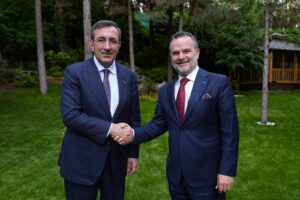
Our Ties with the Gulf Are Very Strong
Question:
What is the current state of Türkiye’s trade relations with the Middle East?
Yılmaz:
In recent years, we have developed truly important relations with the Middle East. Politically, we see a very active diplomatic traffic. Beyond that, I can say that our private sector and civil society interactions are also in a very good state.
We have extremely positive diplomatic relations with many countries, especially Saudi Arabia, Qatar, and the United Arab Emirates. These strong diplomatic ties also positively impact our economic relations.
Türkiye is a significant country that offers major investment opportunities. And with the policies and programs we are currently implementing, we are in a more advantageous position in terms of establishing long-term stability.
Therefore, I expect that as our program progresses, investments from these countries into Türkiye will continue to increase.
We Share a Common Destiny with Qatar
Qatar is a country with which we share exceptionally close ties—so much so that we consider it a partner in our shared destiny. Therefore, we have a relationship that deserves every positive attribute. For example, when we experienced the earthquake, the solidarity and brotherhood Qatar displayed deeply moved us. In the past, when Qatar faced certain difficulties and challenges, Türkiye stood firmly by its side. These are all clear indicators of the strength of our relationship.
We also maintain strong economic ties with Qatar. Both countries benefit from this relationship. We always view these ties through the lens of a win-win approach—this applies to our relations with other countries as well. However, with Qatar in particular, our close political and strategic relations provide a solid foundation for our economic partnership.
Our Trade Target with the U.S. Is 100 Billion Dollars
Question:
What is the current state of Türkiye-U.S. relations after Trump? For instance, are there any developments regarding CAATSA sanctions?
Yılmaz:
We hope these sanctions will be lifted as soon as possible. In his previous term, President Trump made several statements acknowledging that Türkiye was treated unfairly and expressing support for Türkiye’s position. I believe that the positive atmosphere initiated between him and our President will be reflected in all these processes.
Hopefully, as these contacts continue, we will all see things improve. If we look at it objectively, there are shared interests. We are both strong NATO allies. Moreover, when you view things not just from a security perspective but also from an economic perspective under today’s global conditions, there is significant potential for progress.
A trade target of 100 billion dollars was set in the past. We must achieve this. Like all countries, Türkiye and the U.S. may experience some challenges. What matters is the ability to see the bigger picture and resolve issues through diplomacy.
I believe the newly appointed U.S. ambassador will also contribute positively in this regard. We will all witness how this process unfolds in the coming period. But based on current conditions and the political perspective that has been presented, I can say that the outlook appears positive.

